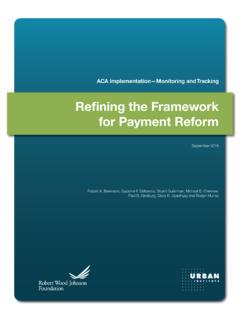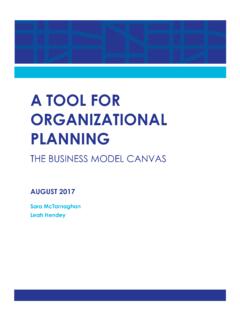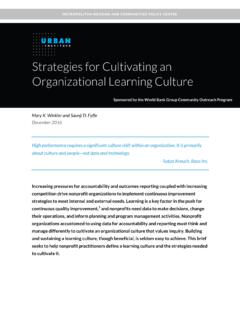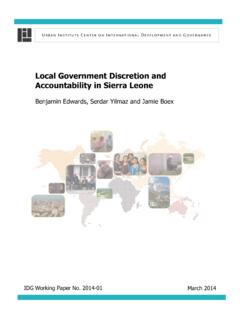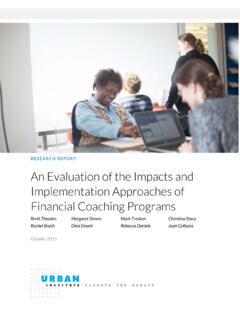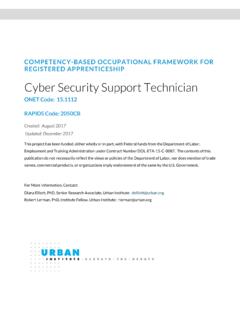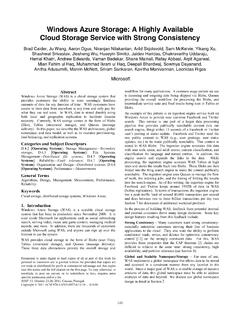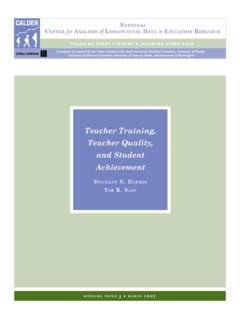Transcription of The Impact of Teacher Experience - Urban Institute
1 Many occupations recognize employees years of Experience as a relevant factor in human resource policies, including compensation systems, benefits packages, and promotion decisions. The idea is that Experience , gained over time, enhances the knowledge, skills, and productivity of workers. In education, Teacher Experience is probably the key factor in personnel policies that affect current employees: it is a corner-stone of traditional single-salary schedules; it drives Teacher transfer policies that prioritize seniority; and it is commonly considered a major source of inequity across schools and, therefore, a target for redistribution.
2 The underlying assumption is that Experience promotes effec-tiveness. But is this really the case? Do students attain higher levels of achievement when taught by more experienced teachers? What is the relationship between Teacher Experience and Teacher productivity? Over 40 years of Teacher productivity research suggests that the simple assumption that more is better requires greater nuance; Experience effects are complex and depend on a number of factors. Recent evidence from CALDER studies using rich state datasets provides new insight into the effects of Teacher Experience .
3 Several key findings emerge, some confirming previous understandings and others raising new questions. These findings have important policy of Experience Strongest during First Few Years of TeachingExperience matters, but more is not always better. The Impact of Experience is strongest during the first few years of teaching; after that, marginal returns diminish. A number of CALDER studies confirm findings from existing research that, on average, brand new teachers are less effective than those with some Experience under their belts (Clotfelter, Ladd, and Vigdor 2007a, 2007b; Harris and Sass 2007; Kane, Rockoff, and Staiger 2006; Ladd 2008; Sass 2007).
4 Early-career Experience has a clear payoff in Teacher effectiveness,1 and the Impact is stronger than the effect of most other observable Teacher -related variables including advanced degrees, Teacher licensure tests scores, National Board certification at the elementary level, and class size (Clotfelter et al. 2007a; Ladd 2008; Sass 2007). Teachers show the greatest productivity gains during their first few years on the job, after which their performance tends to level off. A study using New York City data illus-trates the diminishing marginal returns to Experience (Boyd et al.)
5 2007). As shown in figure 1, the largest gain in math achievement attributable to Teacher Experience is associated with teachers progression from their first year Urban Institute The Impact of Teacher Experience Examining the Evidence and Policy ImplicationsJennifer King RiceBRIEF 11 AUGUST 2010 The Impact of Experience is strongest during the first few years of teaching; after that, marginal returns diminish. 2 of teaching to having one full year of That first year of Experience accounts for almost half the cumulative Experience effect in grades 4 5 (.06 standard deviation [SD]) and more than half the cumulative effect in grades 6 8 (.
6 04 SD). This and other research shows that, on average, teachers with more than 20 years of Experience are more effective than teachers with no Experience , but are not much more effective than those with 5 years of Experience (Ladd 2008). Studies have also documented some evidence that effectiveness declines after some point, particularly among high school teachers. In fact, evidence suggests that the most experienced (greater than 25 years) high school mathematics teachers may be less effective than their less experienced counterparts (Ladd 2008) and even their inexperienced colleagues (Harris and Sass 2007).
7 Despite the positive effects of early-career Experience , the performance distributions of experienced teachers versus those with little or no Experience reveal considerable overlap in value-added scores in both mathematics and reading. As shown in figure 2, while less experi-enced teachers tend to be less effective than more experienced teachers as a whole (evidenced by the performance distributions of teachers with no Experience and one to two years of Experience shifted to the left of the performance distribution of more experienced teachers), many less experi-enced teachers have value-added scores compa-rable to or exceeding those of their more experi-enced counterparts (evidenced by the substantial overlap among the three distributions).
8 Research has shown that other policy-relevant factors such as a Teacher s academic training and prepa-ration program may equal or even outweigh the Impact of early-career , the differential attrition of teachers with different levels of effectiveness may confound findings about the effects of Teacher Experience . While some evidence suggests that teachers who remain teaching after three years are less effective on average than those who leave (Clotfelter et al. 2007a), other research has found that less effective teachers are more likely to transfer and leave teaching (Boyd et al.)
9 2009; Goldhaber, Gross, and Player 2007; Harris and Sass 2007). These conflicting findings raise questions about whether the measured effects of Experience reflect improvement with Experience or higher attrition of less effective Effect of Early-Career Teaching Experience Strongest and Most Consistent in Elementary and Middle School, and in MathThe magnitude of the effect of Teacher Experience varies depending on the Teacher s level of education and the subject area. The Impact of early years of Experience is strongest in the subject of math and more consistent at the elementary and middle school levels than at the high school level (Harris and Sass 2007).
10 According to one study using data from North Carolina, elementary school teachers with one or two years of Experience are more effective, on average, than teachers with no Experience by .06 SD in math achievement, and .03 SD in reading achievement. Findings on the Impact of Teacher Experience at the high school level are less definitive. A study using North Carolina high school data estimates the effect of early-career Experience as .05 SD, with the largest effects observed for student achievement in mathematics and In contrast, a study using data from Florida finds little evidence Despite the positive effects of early-career Experience , the performance distributions of experienced teachers versus those with little or no Experience overlap considerably in value-added scores for both mathematics and reading.
